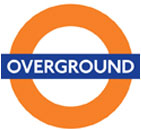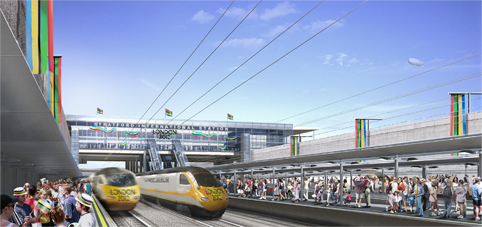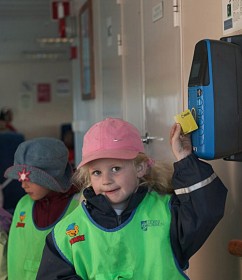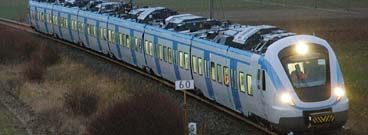Erik's Rail News
Copper theft stops trains on Stockholm-Malmö main line
Copper theft stopped trains for hours on Sweden's Stockholm-Malmö main line April 3rd. Another theft in March had seventy trains cancelled. The government is now trying to stop thefts by requiring the buyer of copper to declare the sales tax. This is currently the responsibility of the seller. See also DN: Kameror och ny lag ska stoppa kopparstölder (April 12th 2012)Breakthrough in Hallandsås tunnel today
Construction of the 8 km Hallandsås tunnel began 1992. After scandals and delays, the tunnel boring machine is breaking through as I type. There will be two parallel tunnels. See also wikipedia entry and live video (August 25th 2010)SJ orders 20 new intercity trains
Swedish SJ is ordering 20 new wide-body Regina trains with bistros for intercity service, says managing director Jan Forsberg. The trains will reach 200 km/h but can later be "reprogrammed" for 250 km/h. They will replace five X 2000 trains currently used on slower and less popular routes. The X 2000 units will be shifted to the Stockholm-Göteborg/Sundsvall/Malmö routes. There are currently 70 Regina trains in operation for regional service in Sweden. Manufacturer Bombardier is currently testing a Regina train at up to 275 km/h as part of the "Gröna Tåget" research and development program. (December 28th 2007)Cheap Train Tickets by Internet Auction
Swedish train operator SJ is teaming up with the auction website Tradera to sell 6000 cheap train tickets each week. You can bid for tickets between 48 and six hours ahead of departure. At the time of writing I see 37 tickets in the 0605 X 2000 fast train from Stockholm to Göteborg. (October 4th 2007)German Union Demands 31% More Pay
Costly German Strike Banned
The GDL union has called off its strike at the German railway tomorrow. The labor court in Nuremberg ruled that GDL, Gewerkschaft Deutscher Lokomotivführer, can't strike until the end of September because industrial action during the peak summer holiday season would do major damage to the economy. GDL had planned a 4-hour strike by freight train drivers on Thursday to back its demand for a 31-percent pay hike and for Deutsche Bahn's 30 000 train drivers and ticket collectors to be given a separate wage contract from other rail employees. However, strikes will go ahead at local train networks in Hamburg and Berlin.A government spokesman said management and union leaders should resume talks to settle the pay dispute that has threatened to have devastating effects on the national economy. DB's lawyer says “The problem is that specialist unions tend to represent those workers who can inflict particularly high damage to a business by striking. The danger is that this could result in higher wages, not for those who provide the best performance, but for those with the highest disruption potential.” See also GDL press release and Financial Times story. (August 8th 2007)
New World Speed Record, 575 km/h
TGV Sets 575 km/h Record
French SNCF and Alstom broke the world rail speed record today, pushing a three-car TGV Duplex to 574,8 km/h. The train almost equalled the maglev record of 581 km/h set in Japan in 2003. The previous record for trains with steel wheels on steel rail was 515, set in France in 1990. The new record is official, in contrast to the unofficial 553 km/h record set in February. The tests have been conducted on the new Paris-Strasbourg high-speed line, phase one of which opens later this spring for service at 320 km/h. See also official site, BBC story and video, CBC video and story, YouTube movies and Jean-Marc Frybourg's beautiful photo. (April 3rd, 2007)New TGV Trials Aim for 570 km/h
 French railway SNCF and train manufacturer Alstom are aiming to break their world record of 515 km/h from 1990. The tests will be done next year on the new Paris-Metz LGV Est, using a new type of TGV train. In the medium term, SNCF hopes to upgrade all its high-speed lines to 320 km/h, possibly 360 km/h, for ordinary service trains. See also discussion thread at Skyscrapercity.com
(December 21st 2006, thanks Dave)
French railway SNCF and train manufacturer Alstom are aiming to break their world record of 515 km/h from 1990. The tests will be done next year on the new Paris-Metz LGV Est, using a new type of TGV train. In the medium term, SNCF hopes to upgrade all its high-speed lines to 320 km/h, possibly 360 km/h, for ordinary service trains. See also discussion thread at Skyscrapercity.com
(December 21st 2006, thanks Dave)Magnetic Speedometer Integrates with GPS
The German government is spending €4m on integrating the GPS satellite navigation system with a magnetic speedometer. The speedometer, called the Lindometer after its inventor at Bombardier, being tested as part of the 250 km/h "Green Train" project in Sweden. The Lindometer measures speed and distance by magnetically detecting track clamps on rails as they go by. This is more accurate than the current method of detecting balises and measuring wheel rotation. The German government hopes the technologies can be integrated to form a simpler and cheaper alternative to ERTMS, the European Railway Traffic System which is to be installed on European high-speed railways by 2020. See also earlier article. (March 26th 2007)One Dead in British Derailment
A London to Glasgow Virgin train derailed on Friday the 23rd. One passenger died. The train appears to have come to rest on its side. Virgin's Pendolino tilting trains have been introduced by Virgin over the last three years and have a top speed of 200 km/h. (February 24th 2007)German Rail Freight Up 10%
German DBAG and competitors have grown freight traffic to the limit. A transport lobby estimates that German trains transported 337 million tonnes in 2006, an increase of 6,2% over 2005. In contrast to road transport, rail freight has increased since 2003 so that there is now a shortage of track, terminals and staff. Tonne-kilometres grew from 95,4bn in 2005 to 105,5bn. See also press releases from the statistics office and DB, and Wikipedia on truck/lorry tolls. (February 24th 2007)UK Franchise Failure
Great North Eastern Railway is to be stripped of its franchise because it is not paying the government the agreed £1,3bn for the privilege of running the London-Edinburgh trains. GNER will now continue to operate the trains for 12-18 months while the franchise undergoes a new round of bidding. The new franchisee is expected to pay hundreds of millions of pounds less than GNER originally bid. (December 21st 2006)Converting Highways to Railways
The US system of interstate highways could be partially converted to 160 km/h railways by converting the inside lanes to broad-gauge rail, says carfree researcher JH Crawford. The idea answers to concerns over rising energy prices due to oil shortages and climate concerns, but also to congestion. The paper presents interesting ideas such as short cars and wheels without axles to save weight. • Another idea is to create a database of existing railways which could in the future be used as part of a national network. The database would make it easy to assess whether or not a line coming up for sale, lease, or abandonment fits a long-term regional or national need. (October 27th 2006)25 years of TGV
Twenty-five years of fast TGV trains in France was commemorated in September by the welding of the last rail of the new Est line which joins Paris with Germany and Strasbourg. Service begins next summer at 320 km/h, connecting Paris and Strasbourg in 2h17. A second phase opens in 2010, reducing trip time to 1h50. In a separate TGV development, trains are being tested on the Mediterranée line at 360 km/h with a view to raising their cruising speed from 300. See also wikipedia entry. (October 27th 2006)Swedish Banks Offer Money for HSR
Banks in Östergötland province promise to lend SEK120m to start building a 150 km long, SEK14bn new railway for 250 km/h by 2010 at the latest. The railway is not included in the SEK100bn national ten-year plan, which does not include any private funding. The new railway, Ostlänken, is likely the only major project which could be profitable as a private-sector project. It would halve travel time from Norrköping to Stockholm to 50 minutes, from 80. See also official site and map. (October 25th 2006)New Swedish Government Increases Rail Funding
The new conservative Swedish government today presented its budget. It will increase rail funding by 14%, to SEK14,2bn. Most of that will go to building and maintaining the railway. The government will keep open access for freight trains but will not extend it to passenger services until later. It notes the timetabling difficulties with open access. I estimate they won't extend open access until the EU does. (October 16th 2006)Stockholm Implements Congestion Charge
Congestion Charge Stops Railway?
The new Swedish government will implement the congestion charge as passed by referendum in the city of Stockholm. The city can not implement the charge on its own due to current law, but there is a consensus to change that law. The new government also wishes to review the SEK 13,7bn (€1,48bn) commuter train tunnel because of the high cost, and will re-investigate possibility of instead building a third track along the existing surface cross-town railway. That would be cheaper, but also add less capacity and further deface the medieval old town. It also says the congestion charge will go to building a new SEK 25bn freeway. No real decisions have been made, except that construction of the tunnel started last spring, and one billion crowns have already been spent.Erik's analysis: There's no logic in stopping an "expensive" 13,7bn rail tunnel in favour of an "inexpensive" 25bn freeway. It's a ruse to appear car-friendly while still implementing the charge. This is the conservatives' way of dealing with a) their own election campaign against the charge, and b) that 14 other municipalities voted no in their own referendums, where voters were asked if Stockholm should implement the charge. Those referendums were a ruse too, because the idea that outlying municipalities can tell Stockholm what to do with their roads, is questionable at best. What happens now is that the tunnel construction continues while the central government appoints a negotiator who will work with municipalities and the province on a transport package. It is unlikely there will be big changes since the last transport package, of which the rail tunnel is a key part, because it was supported by both political blocks. See also commuter train tunnel project page in English and story at thelocal.se in English. (October 16th 2006)
New London Overground
 London's mayor continues to use unconventional methods to solve traffic problems, now with a radical new concept, the overground railway. From November 2007, London Overground train services will operate on the North London Railway under the management of Transport for London (TfL), when it assumes responsibility for the line from the Department for Transport. Operating under a new TfL London Rail Concession, London Overground services will also run on the East London Railway when it opens in 2010, following TfL's £1bn extension of the existing East London Line. The contract to run London Overground services on both these lines will be awarded by TfL to a single train operator, under strict conditions to meet TfL's requirements for safety, security, staffing, ticketing and train frequency. See also BBC story and Wikipedia entry.
(October 16th 2006, thanks Ifor Davies)
London's mayor continues to use unconventional methods to solve traffic problems, now with a radical new concept, the overground railway. From November 2007, London Overground train services will operate on the North London Railway under the management of Transport for London (TfL), when it assumes responsibility for the line from the Department for Transport. Operating under a new TfL London Rail Concession, London Overground services will also run on the East London Railway when it opens in 2010, following TfL's £1bn extension of the existing East London Line. The contract to run London Overground services on both these lines will be awarded by TfL to a single train operator, under strict conditions to meet TfL's requirements for safety, security, staffing, ticketing and train frequency. See also BBC story and Wikipedia entry.
(October 16th 2006, thanks Ifor Davies)
London & Continental Railway Suggests HSR to Scotland
London & Continental Railways - the group behind the CTRL - are to put forward a London to Scotland high speed rail scheme to the Department for Transport this autumn. Their scheme would cost between £12 billion and £19 billion depending on the route chosen. The timing of this will depend on the release of the Eddington Report. See also Wikipedia entry. (October 16th, thanks Dave)Stratford International Construction Complete
 The Stratford International station project in England was completed in April. Delivered on time and within budget, it represents not only a major milestone for the Channel Tunnel Rail Link but, in addition, the station is the centrepiece of Olympic transport plans for the London 2012 Games. See also another photo.
(October 16th, thanks Dave)
The Stratford International station project in England was completed in April. Delivered on time and within budget, it represents not only a major milestone for the Channel Tunnel Rail Link but, in addition, the station is the centrepiece of Olympic transport plans for the London 2012 Games. See also another photo.
(October 16th, thanks Dave)
Transrapid Crash in Germany
An elevated magnetic train crashed today on a test track in north-western Germany, killing several people. The train, which floats on a monorail via a magnetic levitation system called Maglev, was going at 200km/h (120 mph) when it crashed. More than 20 people were injured, police said. The train was carrying at least 30 people at the time. (September 22nd 2006)Fast Fat Train Reaches 281 km/h
Beats Swedish Record from 1993
A specially equipped widebody Bombardier Crusaris Regina train reached 281 km/h today on the Stockholm-Göteborg main line in Sweden. The tests are part of the "Green Train" project which includes an active bogie which is stiff on straights and soft in curves, as well as a trackside noise camera system which uses recent increases in computer power to understand noise emissions from fast trains. Bombardier says a 250 km/h train could be ready for commercial service by 2011. This would be the third tilting 250 km/h train after Alstom's Pendolino and Bombardier's Amtrak Acela Express (240 km/h).The widebody Regina was conceived as a cheap and capacious train for regional service. It seats five abreast and is 3,45m wide, over 60cm wider than a typical European train. Over 70, two- and three car trains were built, in versions for 180 and 200 km/h. They are similar but wider than the Øresund trains which also run in Denmark. Bombardier calls these the Crusaris Contessa. See also Göteborgs-Posten story and official website. (July 26th)
Göteborg gets out of Touch
 Västtrafik, the regional transit authority in western Sweden, has rolled out the new contactless smart card in the northern part of the region. In a few weeks, it will be launched in Göteborg, and the rest of the region in May. Faster, contactless ticket punching is expected to improve punctuality. The new cards can act as monthly passes or a pay-as-you-go plan for any town in the region in any combination. The information on the card can be accessed by holding it up to a machine and pressing the question mark button. Future plans for the card include interoperability with transit in Stockholm and København, which are installing the same system. The cards also have other uses, like paying for car rentals or parking, but for now Västtrafik is concentrating on a smooth changeover to the new system.
(April 13th)
Västtrafik, the regional transit authority in western Sweden, has rolled out the new contactless smart card in the northern part of the region. In a few weeks, it will be launched in Göteborg, and the rest of the region in May. Faster, contactless ticket punching is expected to improve punctuality. The new cards can act as monthly passes or a pay-as-you-go plan for any town in the region in any combination. The information on the card can be accessed by holding it up to a machine and pressing the question mark button. Future plans for the card include interoperability with transit in Stockholm and København, which are installing the same system. The cards also have other uses, like paying for car rentals or parking, but for now Västtrafik is concentrating on a smooth changeover to the new system.
(April 13th)
Transit Offers Carpool Package
 Stockholm Transit is to start selling a package deal with a transit pass, carpool membership and taxi rides to companies as an alternative to company cars. SL expects the initiative to increase sales of transit passes by the thousands. SL says the package lets companies cut costs on parking and leasing. See also SL press release.
(March 29th)
Stockholm Transit is to start selling a package deal with a transit pass, carpool membership and taxi rides to companies as an alternative to company cars. SL expects the initiative to increase sales of transit passes by the thousands. SL says the package lets companies cut costs on parking and leasing. See also SL press release.
(March 29th)
336 km/h in Netherlands
A modified Thalys train reached 336 km/h in The Netherlands om March 2nd on the new, high-speed HSL Zuid. The train is being used to test the ERMTS signalling system. See also movies of the event, halfway down the page. (March 22nd, thanks Pom)MP Gets Folding Bike
Due to overcrowding, bikes are now banned on some train services into London. Cyclist and Member of Parliament Boris Johnson (Tory) is therefore considering a folding bike for his personal use, since folding bikes are considered luggage and thus permitted free of charge on all trains. Also, Brompton Bikes is again sponsoring the 'Cycling by train' leaflet covering trains in Britain. See also Cycling by train leaflet and BikeBiz story. (March 7th)Finland and Russia plan High-speed Link
The Finnish and Russian railways yesterday announced a joint venture to open a high-speed train link between the two countries by 2008. It would initially use Pendolinos, already in use in Finland, and cut the current St Petersburg-Helsinki trip time of five and a half hours by at least two hours. (February 16th)New Franchisee for Stockholm Commuter Trains
 The Stockholm commuter trains, known locally as pendeltåg or pendulum trains, are to be run by the new franchisee Stockholmståg starting June 18th. The decision was announced November 29th but was challenged legally. The administrative court of appeal yesterday decided there will be no trial. The current franchisee, Citypendeln, was initially plagued by a driver shortage and later by a shortage of vehicles and track. Stockholmståg is owned by the private Tågkompaniet and state-owned SJ AB. The franchise runs for five years and is worth SEK6bn or €647m. Trains will be maintained by Euromaint at the Älvsjö depot and the new Bro depot for the new Alstom X60 trains. See also older story, Stockholmståg website, press releases from Euromaint and SL, and SL's X60 page.
(February 15th, 2006)
The Stockholm commuter trains, known locally as pendeltåg or pendulum trains, are to be run by the new franchisee Stockholmståg starting June 18th. The decision was announced November 29th but was challenged legally. The administrative court of appeal yesterday decided there will be no trial. The current franchisee, Citypendeln, was initially plagued by a driver shortage and later by a shortage of vehicles and track. Stockholmståg is owned by the private Tågkompaniet and state-owned SJ AB. The franchise runs for five years and is worth SEK6bn or €647m. Trains will be maintained by Euromaint at the Älvsjö depot and the new Bro depot for the new Alstom X60 trains. See also older story, Stockholmståg website, press releases from Euromaint and SL, and SL's X60 page.
(February 15th, 2006)
Finnish Trains Faster Next Fall
 The Kerava-Lahti cutoff northeast of Helsinki in Finland will start commercial service next fall. Travel time Kuopio-Helsinki will be reduced about an hour from 4.40. The new track will itself save half an hour, while the deployment of faster InterCity and tilting Pendolino trains as well as electrification account for the rest. There will also be more trains, such as at Jyväskylä where there will be 13 daily direct Pendolinos compared to a total of six direct trains now. The 18th and final Pendolino will arrive in Finland next year. Last year 793 000 passengers travelled on Pendolino trains. VR says this is the most significant upgrade in rail services in Finland for decades.
See also railway map of Finland more about the Pendolino, article on Finnish rail improvements, and photos of Helsinki station.
(November 30th, 2005)
The Kerava-Lahti cutoff northeast of Helsinki in Finland will start commercial service next fall. Travel time Kuopio-Helsinki will be reduced about an hour from 4.40. The new track will itself save half an hour, while the deployment of faster InterCity and tilting Pendolino trains as well as electrification account for the rest. There will also be more trains, such as at Jyväskylä where there will be 13 daily direct Pendolinos compared to a total of six direct trains now. The 18th and final Pendolino will arrive in Finland next year. Last year 793 000 passengers travelled on Pendolino trains. VR says this is the most significant upgrade in rail services in Finland for decades.
See also railway map of Finland more about the Pendolino, article on Finnish rail improvements, and photos of Helsinki station.
(November 30th, 2005)
More Tracks in Stockholm Mean Less Air in Timetables
 The second Årsta bridge in Stockholm was completed in August while the original bridge from 1929 will re-open in December after renovations. The reduced congestion will increase punctuality for local and regional trains as well as most long-distance trains in southern Sweden. The 6:00 express from Göteborg will arrive in Stockholm at 8:45 starting January 9th, compared to 8:55 now, for the first time being faster than airlines according to www.helaresan.se. See also timetable no. 60.
The second Årsta bridge in Stockholm was completed in August while the original bridge from 1929 will re-open in December after renovations. The reduced congestion will increase punctuality for local and regional trains as well as most long-distance trains in southern Sweden. The 6:00 express from Göteborg will arrive in Stockholm at 8:45 starting January 9th, compared to 8:55 now, for the first time being faster than airlines according to www.helaresan.se. See also timetable no. 60.
 (November 28th)
(November 28th)
Hector Rail Buys Two Eurosprinters
 Private Swedish freight operator Hector Rail has ordered two electric 6400 kW EuroSprinter locomotives from Siemens. They will be the same as DB's class 189. Though they can run on many different electrical systems, Hector does not plan to use them outside the Swedish/Norwegian home market.
Hector has also tested one of Austrian ÖBB's three 1012 locomotives and one 1142, which is a standard loco widely deployed in Austria since the seventies and modernised in the nineties.
Hector Rail is a spin-off from the liquidated Ikea Rail, using Rc locos rented from SJ as well as six El15 ore locos from the Norwegian ore railway, which have been fixed up and re-designated class 161. Operations started in December 2004. One of the founders has a son named Hector.
See also Tåg-nytt bulletin.
(November 28th)
Private Swedish freight operator Hector Rail has ordered two electric 6400 kW EuroSprinter locomotives from Siemens. They will be the same as DB's class 189. Though they can run on many different electrical systems, Hector does not plan to use them outside the Swedish/Norwegian home market.
Hector has also tested one of Austrian ÖBB's three 1012 locomotives and one 1142, which is a standard loco widely deployed in Austria since the seventies and modernised in the nineties.
Hector Rail is a spin-off from the liquidated Ikea Rail, using Rc locos rented from SJ as well as six El15 ore locos from the Norwegian ore railway, which have been fixed up and re-designated class 161. Operations started in December 2004. One of the founders has a son named Hector.
See also Tåg-nytt bulletin.
(November 28th)
Germany Commits to Bridge to Denmark
The new German government under conservative Angela Merkel has committed itself work to build a 20km, €3bn bridge across the Fehmarn strait to Denmark. It would cut trip time between København and Hamburg from four and a half hours to two and a half hours. The Danish minister of transport expects to sign a treaty on this in January 2006, so that the bridge may open in 2015 or 2016. See also stories at Danmarks Radio and Dagens Nyheter. (November 18th)
(November 18th)
Via Rail Installs WiFi
Parsons, an engineering firm, is installing WiFi wireless internet in VIA's Québec City-Windsor trains, 22 stations and seven lounges. Satellite and mobile phone communications will link VIA's Li-Fi network to the internet. See also VIA's wireless internet page. (November 18th)
(November 18th)
Taiwan Testing at 300 km/h
A test train reached 300 km/h on October 29th. The tests are done mainly to check the trains' acceleration and braking systems, and their integration with the track, machinery and electronics system. The 345 km Taipei-Kaohsiung railway was to have opened in October but that has apparently been delayed. See also Taipei Times bulletin (scroll to the bottom) and official site with map. (November 18th, thanks Alan Reekie)
(November 18th, thanks Alan Reekie)
TGV Starts German Testing
La Vie du Rail reports that the first TGV POS – Paris - Ostfrankreich - Süddeutschland power unit, number 4401, was delivered for testing on October 13th. It is due to cross the Rhine soon for tests intended to obtain authorisation for running in Germany. See also La Vie du Rail website. (November 18th, thanks Alan Reekie)Athens Suburban Railway Extension
A 200 km/h suburban railway linking Athens with its airport has been extended to Corinth, which is now 70 minutes from the aiport by train. The railway is called Proastiakos, which is Greek for "the Suburban". It is 88km long, cost €475m and was opened September 27th. (November 18th, thanks Zane Katsikis)British Stations to Trial Airport Scanners
Plans for airport-style security scanners at railway stations with armed police scrutinising passengers are being drawn up to try to stop terrorist attacks on the British rail network. The pilot scheme at Paddington will only cover the Heathrow Express line, and will allow officials to find out how much disruption it would cause. (November 7th)Sweden Catches up to Bicycles
Don't Bike in Sweden
Most Swedish trains do not take bicyles. Passengers are recommended to have them shipped by a third party and arriving days later. But bikes can be taken on trains in many other European countries. Tourism officials interviewed for a recent government study say this hurts Swedish tourism, since people assume they can take their bike on the train in Sweden too. Work will now proceed with adding bike information to online timetables so you see which trains take bikes. There will also be a clarification on who pays for bike stands in trains, since it could be any of the vehicle owner, the train operator, or the traffic company. (November 6th)Arlanda Airport Bike Project
 Sweden's Stockholm Arlanda Airport has begun a bike project where eight employees take commuter trains to Märsta and bike the 5-7km from there to the airport. Bikes are stored in a Pendula bike garage in Märsta overnight. The same bike garage is available at Linköping train station. Lund station has the mother of all bike garages with several levels and a bike elevator. Stockholm transit makes SEK100 000 in two years from the eight passengers' transit passes.
See also Pendula Bike Garage, Cykla till Jobbet/Bike to Work and Lundahoj Bike Garage (scroll halfway down) and zoomable maps of Arlanda, Linköping, and Lund.
(November 6th)
Sweden's Stockholm Arlanda Airport has begun a bike project where eight employees take commuter trains to Märsta and bike the 5-7km from there to the airport. Bikes are stored in a Pendula bike garage in Märsta overnight. The same bike garage is available at Linköping train station. Lund station has the mother of all bike garages with several levels and a bike elevator. Stockholm transit makes SEK100 000 in two years from the eight passengers' transit passes.
See also Pendula Bike Garage, Cykla till Jobbet/Bike to Work and Lundahoj Bike Garage (scroll halfway down) and zoomable maps of Arlanda, Linköping, and Lund.
(November 6th)